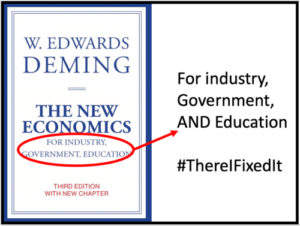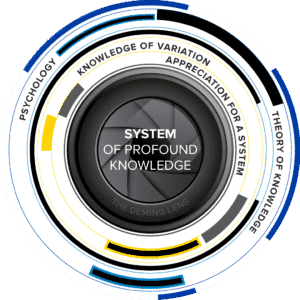 By: Christina Dragonetti, The Deming Institute
By: Christina Dragonetti, The Deming Institute
When you’re new to Deming, some of the philosophy makes sense immediately; some of it is confusing because it’s the opposite of supposedly “tried and true” management methods, and the amount to learn can seem overwhelming. At least, that’s how I felt when I started at The Deming Insitute less than a year ago. The AIM of this post is to describe my Deming journey so far and provide some suggestions for anyone else beginning to learn the Deming philosophy.
Let’s start with a story from early in my career:
A few years after I graduated from college, I started working for a large language learning company working my way up to Director of the local school. I was the primary sales person, and I oversaw about ten teachers, all of whom were native speakers of the languages they taught and were from all over the world. It was great! I loved learning about all the cultures and languages.
and I oversaw about ten teachers, all of whom were native speakers of the languages they taught and were from all over the world. It was great! I loved learning about all the cultures and languages.
The company itself was in disarray, so I was able to create a working environment different from the other schools. And I was so inexperienced that I made some odd mistakes. Like when I sat my three administrative staff in a room with me and asked them to tell me everything I did that frustrated them. It worked to clear the air on some issues but made the atmosphere in the office awkward for weeks.
The bigger picture was grimmer: our tiny island of a school was doing ok, but the U.S. division of the company overall was losing market share and headed toward oblivion. A few years before, the Japan division was in decline, and a small team of managers had transformed it into the largest grossing division in the world. When the U.S. was in trouble, it seemed to make sense to send the successful Japanese country manager to the U.S. to help turn the company around. I don’t remember hearing the Deming name, but I now know some of their improvements were grounded in his theories.
- Consistent communications from the U.S. head office helped create a constancy of purpose. (14 Points for Management: Point 1)
- They instituted training for managers and teachers. (14 Points for Management: Point 6)
- A more standardized curriculum was implemented to keep variation between student experiences and schools to a minimum. (Knowledge of Variation)
- Each school hired an instruction manager to make our processes visible and provide ongoing training and coaching to teachers. (14 Points for Management: Point 5)
These investments built a lot of trust between staff and the new country manager’s team. Then they deviated from the Deming methods.
They began to provide performance bonuses and hold short-term competitions among the salespeople across the U.S. The competitions weren’t popular because it seemed that the people who consistently performed well just got additional bonuses, while those of us in smaller markets or who had less support never won.
One competition was a disaster.
 They offered a big bonus to one salesperson in the U.S. who could sell the most 5-day language packages over four weeks and smaller bonuses to the highest performer in each of the nine districts. The winners were announced in an email that said no one would receive a bonus because the U.S. hadn’t met the minimum sales target for that period.
They offered a big bonus to one salesperson in the U.S. who could sell the most 5-day language packages over four weeks and smaller bonuses to the highest performer in each of the nine districts. The winners were announced in an email that said no one would receive a bonus because the U.S. hadn’t met the minimum sales target for that period.
The result was outrage among the salespeople. One person replied to that email, cc’ing everyone in the country, that he could not be held responsible for the performance of people he didn’t even know. Furthermore, as the top salesperson in his district, he would look into legal action if he didn’t get his bonus.
The new management team was shocked! How could an employee want a bonus if the company as a whole didn’t perform well?
A few days later, they sent another email saying they would pay the bonuses, but the chasm of mistrust was suddenly immense – all the goodwill the new managers had built was gone in a flash.
I assumed it was a cultural issue – that there was something inherent in the Japanese culture that was fundamentally incompatible with American salespeople. Now I understand that they made two crucial mistakes: the first was to try to copy the Japanese model exactly, and the second was to misunderstand the psychological aspect of business management, one of the four elements of Deming’s System of Profound Knowledge (SoPK).
After three years, I left that company and spent the last 15 years working in nonprofits. In August of 2021, I started at The Deming Institute.
 I tried to drink from the firehose of Deming knowledge in my first two weeks. I learned that the Deming philosophy is all-encompassing – for work and life. I learned that people who knew Dr. Deming loved him and did their best to introduce others to his philosophy. And I learned that business owners and managers implementing Deming were happy, successful people.
I tried to drink from the firehose of Deming knowledge in my first two weeks. I learned that the Deming philosophy is all-encompassing – for work and life. I learned that people who knew Dr. Deming loved him and did their best to introduce others to his philosophy. And I learned that business owners and managers implementing Deming were happy, successful people.
My job as communications and fundraising manager means I need to understand at least the basics of the Deming principles and be able to translate them for others. So in my first week, I went through hours of DemingNEXT courses and read The New Economics for Industry, Government, Education (3rd Edition).
I ran into a few stumbling blocks immediately. The New Economics is tough to read, and even now, I’ve only made it halfway through Dr. Deming’s first book Out of the Crisis. Both books are dense, and in my first week, I felt like I was wrestling with the material rather than opening my brain to a flow of information. Part of the problem is the time they were written: I was three years old when Out of the Crisis was published.
More than that, Dr. Deming was an academic and statistician, not a writer for general audiences.
It wasn’t until I saw a video of Dr. Deming presenting in a 4-day seminar that I realized: he wrote exactly as he spoke. (Although his refusal to include “and” at the end of a list still bugs me.) With his voice in my head, I more easily focused on the concepts rather than fighting with the sentence structures. (You can find lots of videos of Dr. Deming on our Youtube channel.)
still bugs me.) With his voice in my head, I more easily focused on the concepts rather than fighting with the sentence structures. (You can find lots of videos of Dr. Deming on our Youtube channel.)
“People are entitled to joy in work” confused me. Work is, well, work. It’s not about joy or fun, though that’s certainly possible in some rare cases. The idea that everyone is entitled to joy sounded crazy.
Then I read in Deming’s 14 points for Management that point 8 is “drive out fear.”
I started to think about all the fear I’d experienced in previous jobs – and how expected and normal it was for me to feel afraid of making mistakes or bad decisions. I was fearful of performance evaluations, nervous about what my coworkers might be saying behind my back, terrified of letting others down, and of retaliation. And that fear drove my choices. Was I trying new things? Was I finding efficiencies? Was I trying to improve communication? Every time I started a new job – absolutely! But I got shot down, ignored, and told to focus only on my role so often that I gave up until I went to a new job and tried again.
My experience wasn’t limited to a specific industry or type of organization: I worked for two colleges, an engineering firm, a software company, a language school, and a children’s clothing company (for two weeks). I also worked for two nonprofit support organizations and an advocacy organization. One had hundreds of employees across the globe, while another had only 4 staff and focused on one state. To varying degrees, I got the same messages and lived with the same kind of low-grade (and sometimes raging) fear. The idea that we could work without fear seemed contrary to my experience.
Then I started to read about the System of Profound Knowledge (SoPK), and I thought: “To get “joy in work,” I have to understand all of SoPK? Yikes.” (Also – how arrogant was this guy to call his own theories “profound knowledge”?!)
 But Dr. Deming was extremely precise when he chose his words. I began to translate to myself: system means framework, profound means deep, and knowledge means understanding. In more practical terms, the system of profound knowledge is the package that holds his recommendations and ideas about how to run any organization – a company, a school, a government department, even your own home. And it includes compassion, respect for people, and dignity.
But Dr. Deming was extremely precise when he chose his words. I began to translate to myself: system means framework, profound means deep, and knowledge means understanding. In more practical terms, the system of profound knowledge is the package that holds his recommendations and ideas about how to run any organization – a company, a school, a government department, even your own home. And it includes compassion, respect for people, and dignity.
We get asked all the time: is Deming still relevant? Are his management ideas practical in modern business? And, how do you implement something as seemingly complex as the System of Profound Knowledge without studying for years to understand it fully?
I go back to our Case Studies to answer these questions. For example, a software engineering company had problems with their sales team not performing well, selling features that didn’t exist, or selling beyond client needs. They were meeting sales targets, but causing chaos in other departments. After learning about Deming, the owners eliminated commissions, and increased salaries a bit, and the sales team worked together to make sure clients had the right solutions. Customer complaints went down, the software engineers stopped resenting the sales team, and everyone was happier without all the tension of competition. They reduced the onboarding of new salespeople by ten months, employee turnover went down, frustration went down, and revenue went up – by a lot. All of this in a modern software company using the most effective management methods they could find.
There’s so much to learn – then you need to internalize it, use it, and think in Deming terms. I recommend starting with something bite-sized – something in your circle of influence at work or in your own life.
I’m lucky enough to work for The Deming Institute, where we try to “walk the talk” every day. We use PDSA (Plan-Do-Study-Act) for process improvement, support each other in making processes visible, and hold study sessions to discuss how Deming’s philosophy applies to our organization.
In my personal life, I started baking a few months ago and use PDSAs to improve my cakes and tarts.
Now that I’ve been with The Deming Institute for nearly a year, I understand how much I still have to learn. I’m not sure anyone ever gets to the end of their Deming journey – even Dr. Deming himself said he learned things from his students every time he taught a class or a seminar. But I’ve been surprised by how useful it is to go back to something I already watched or read because I learn different lessons each time.
If you’re starting your Deming journey, I hope you are inspired to believe that modern workplaces can be a source of joy. And, whatever your sphere of influence, you find a small Deming bite to work on.



Christina, thanks so much for sharing your journey and your continued enthusiasm. Deming thinking often seems counter intuitive, so it’s a hard message to share but vitally important for improving work and life skills in a world where business as usual is the norm.
Great post. Thank you for sharing!
Christina, Your blog will help people at the beginning of their knowledge journey and those who are on their way. Thanks for writing.
Thank you Ed!